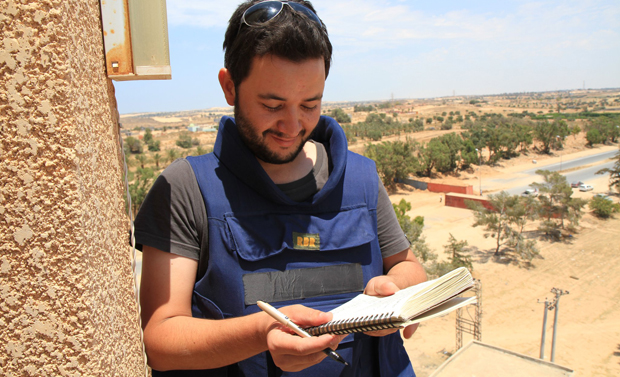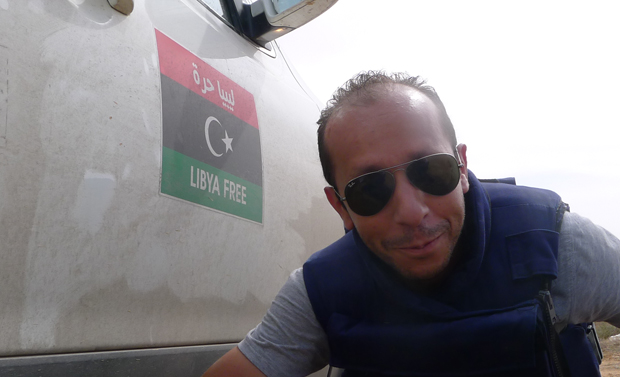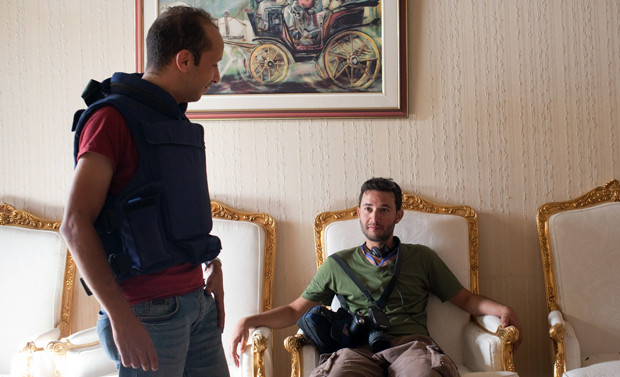Fixers do not often get attention for the right reasons.
Even those who do their job exceptionally well toil in relative anonymity. Those who become part of the story tend to do so only in tragic circumstances.
Earlier this year, reports emerged that a BBC fixer had been killed in Afghanistan during an attack on a military compound. In August, NBC reported that a fixer in Libya had died in a rocket attack on his car.
But the actions, and even deaths, of the industry's indispensable local support staff rarely make the headlines. When New York Times photographers Anthony Shadid, Stephen Farrell, Lynsey Addario, and Tyler Hicks were captured in Libya in February their stories were reported around the world, especially their safe release.
But very few people would have heard the name of their driver, Mohamed Shaglouf, who was never found. His brother later told the press that he was dead.
In a 2007 survey of journalists in Iraq by the Project for Excellence in Journalism, 57 per cent said that one of their local support staff had been killed in the course of their work.
The danger for fixers is very real. The recognition, however, is not.
One small but significant attempt to redress that balance is the Martin Adler Prize. The prize, which is named after a Swedish cameraman killed in Somalia in 2006 and forms part of the Rory Peck Awards, recognises the work of local freelancers – cameramen and women, fixers, drivers or translators.
This year's winners are Suliman Ali Zway and Osama Alfitory, two Libyan fixers who worked with some of the world's most established foreign correspondents during the country's tumultuous revolution.
Zway and Alfitory were construction workers who quit comfortable jobs to volunteer for the Western journalists that flooded into Benghazi when the February protests turned to armed rebellion.
How it began
"It all came by chance at the beginning," Zway tells me during a trip to London to collect his award.
"The protests were over and the fighting was just beginning. Only a few were fighting and had gone to the frontline. A lot of journalists came in and wanted to get an idea of what was happening."
"No one really knows anything about Libya," Alfitory says, "but suddenly all these journalists came to Benghazi to find out what was going on".
"In the beginning I had decided to fight with the rebels, as it was our duty to protect our city. But just for a moment, until in my mind I realised that to help the journalists would be a much better cause. Back in February there were a lot of people starting to fight but not many helping journalists."

Osama Alfitory. Image: Patrick Wells
The numbers swelled as young locals volunteered to help international journalists make sense of the chaotic situation in Libya, but what was for most to be a few weeks of odd work became for Zway and Alfitory eight months' full-time occupation as they crisscrossed the various frontlines in Benghazi, Tripoli and Sirte.
"We loved the work and we just keep going," Zway says.
"And we just kept working for more and more journalists, one after another. We travelled from frontline to frontline. Wherever there was news, we went."
That dogged work ethic, along with the skills they picked up along the way, led to the two becoming known among Western journalists as the "A-team".
"We fought over them", says freelance videographer Rachel Beth Anderson, who nominated them for the prize. "We struggled to book them."
"I was there for the majority of the revolution and I saw how they worked in Benghazi and then in Tripoli, Sirte and the western mountains.
"I saw them help everybody, from the top-tier publications to poor beleaguered freelancers like me, and help everybody the same amount.
"As long as the person was getting out the real story of what was happening they didn't care who they were. It was about getting out correct journalism."
Even if that meant negative coverage of the rebels?
"Absolutely. They were helping tell both sides of the story. If the rebels got it wrong they weren't trying to hide that."

Suliman Ali Zway. Image: Kareem Fahim
Getting the story out
Anderson isn't exaggerating when she says "top-tier publications". Zway worked closely with Jon Lee Anderson of the New Yorker and Alfitory with Leila Fadel of the Washington Post, and between them they worked for the BBC, the New York Times, PBS, CBS, and a host of freelancers.
Both have also penned articles for a new Libyan magazine, "the Libyan".
But talking to Zway and Alfitory, it is not the glamour or excitement of working for prestigious international news organisations or seeing their own articles published that stands out as their motivation. It is simply what Zway repeats several times during out conversation: "getting the story out".
"I realised that without help the journalists weren't going to get the story out.
"It happened before in 2006. We had a revolution in Benghazi and it was controlled after 10 days because nobody could report it, nobody could get word out.
"I knew it would be important to help the journalists keep on top of things and to do everything it took to help them report the truth."
But doing everything it takes in a war zone means putting yourself in danger, even if you are not wielding a gun. There were close calls, Zway says.
"When you go to a frontline and its just an army of volunteers with AK-47s fighting against a regular army, it's dangerous.
"It wasn't organised, we didn't know what we were doing. It was dangerous."
Zway has lost friends and family, he tells me. And he knew Tim Hetherington, the British-born journalist who was killed in Libya in April.
"The day I found out [about Tim's death] was overwhelming.
"You don't expect these things and you don't know what kind of reaction you'll have.
"It was just overwhelming."
Hethington's death prompted a debate about the treatment of local staff by international news organisations. Freelance photographer Teru Kuwayama heavily criticised the New York Times in response to its obituary of the photographer, accusing the newspaper of focusing on its reporters and not offering enough support to its fixers and their families.
The lack of support for fixers is "legendary", Jon Lee Anderson tells me.
"The media industry is a fairly loose and wild place; the lack of support and safeguards for freelancers and fixers and other local support staff in foreign environments is legendary – and more so in these economically difficult times, which is why the turnout at the event last night was so heartwarming, and why the role of the Rory Peck Trust is so important.
More than a work relationship
Zway and Alfitory are now in London to attend the Rory Peck Awards ceremony, and will stay for two weeks to "unwind after eight months of conflict".
Their trip was part-funded by Jon Lee Anderson and organised by a group of journalists who worked with them, including Fadel.
Anderson is unequivocal about the importance of Zway's and Alfitory's work and the award it has won them.
"The work Suliman and Osama did for me, as they did for others in Libya, was essential," he says.
"They were my trusted eyes and ears in an alien environment and my sounding boards for everything; together we found and reported the stories I later published. There were many reporters who did not have such fixers and they really struggled."
Like everyone I speak to, he emphasises that there was a friendship forged as they negotiated Libya's dangerous frontlines.
"Ours was more than a work relationship. In a war situation like Libya was, we shared everything: the risks, the lack of sleep, the search, sometimes, of food and water and a place to stay. They were the very best of Libyans, and we became friends."
His sentiments are echoed by Fadel.
"Zway introduced me to his family and taught me about life in Benghazi. He tirelessly tried to help me understand what was happening in Misurata through phone interviews when we couldn’t get there.
"Both did it because they cared about their country and wanted the stories, good or bad, to reach the world."
Having let journalists, including freelance video journalist Patrick Wells, stay in their houses in Benghazi, Zway and Alfitory are now staying with Wells in London.
They are adjusting to being out of Libya, Zway says.
"It's weird being in a place where there is no shooting in the air."
The future
"They got to work with the cream of the crop basically," says Rachel Anderson. "They got to see some of the best journalism that you can buy. It would be a dream internship for anyone going into the field."
But now that the press is inevitably turning its attention elsewhere, will Zway and Alfitory choose to return from their dream internship to the lives they led before the revolution began?
"To be honest, I'm kind of torn about it," Zway says.
"I loved the job I was doing before it all started, but at the same time it's not going to go back to the way it was.
"What I was doing as a journalist - I'm going to try to carry on doing this until the construction picks up at least. Who knows, maybe I will carry on with the journalism part-time."
And what about the situation in Libya?
"It is much more stable," he says, "but it is going to be a huge challenge building the country again. We don't have any institutions, we don't have anything in Libya, we're going to have to build it from the scrap.
"We're not very experienced, but there is a will."
This article was updated shortly after publication to include Jon Lee Anderson's comments, which he was unable to provide by the time of publication.
Free daily newsletter
If you like our news and feature articles, you can sign up to receive our free daily (Mon-Fri) email newsletter (mobile friendly).
Related articles
- 'Social media needs to put the person at the heart of the story'
- Tom Coghlan: Events in Syria may vanish into 'black hole'
- Journalists freed from Libya speak to press about detention
- Fresh hope that British journalists in Libya will be freed 'very soon'
- Citizen journalism, cyber censorship and the Arab spring










